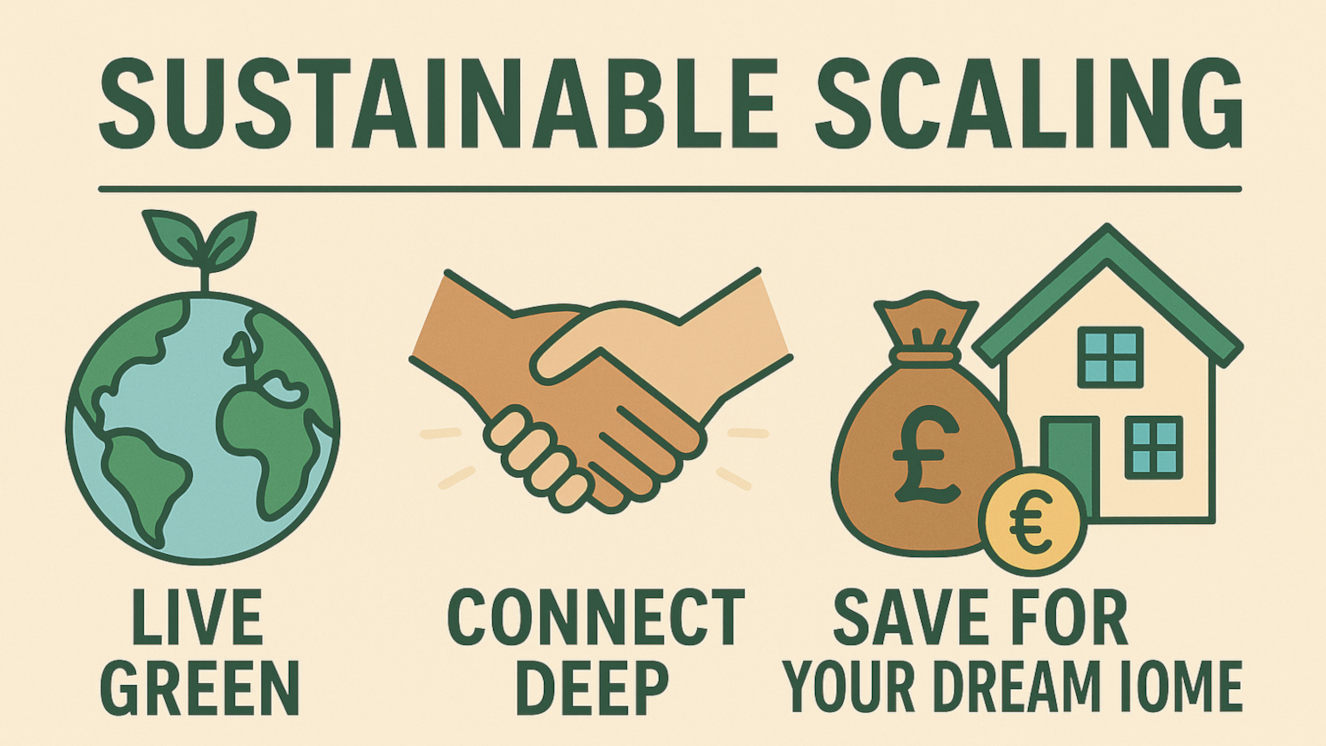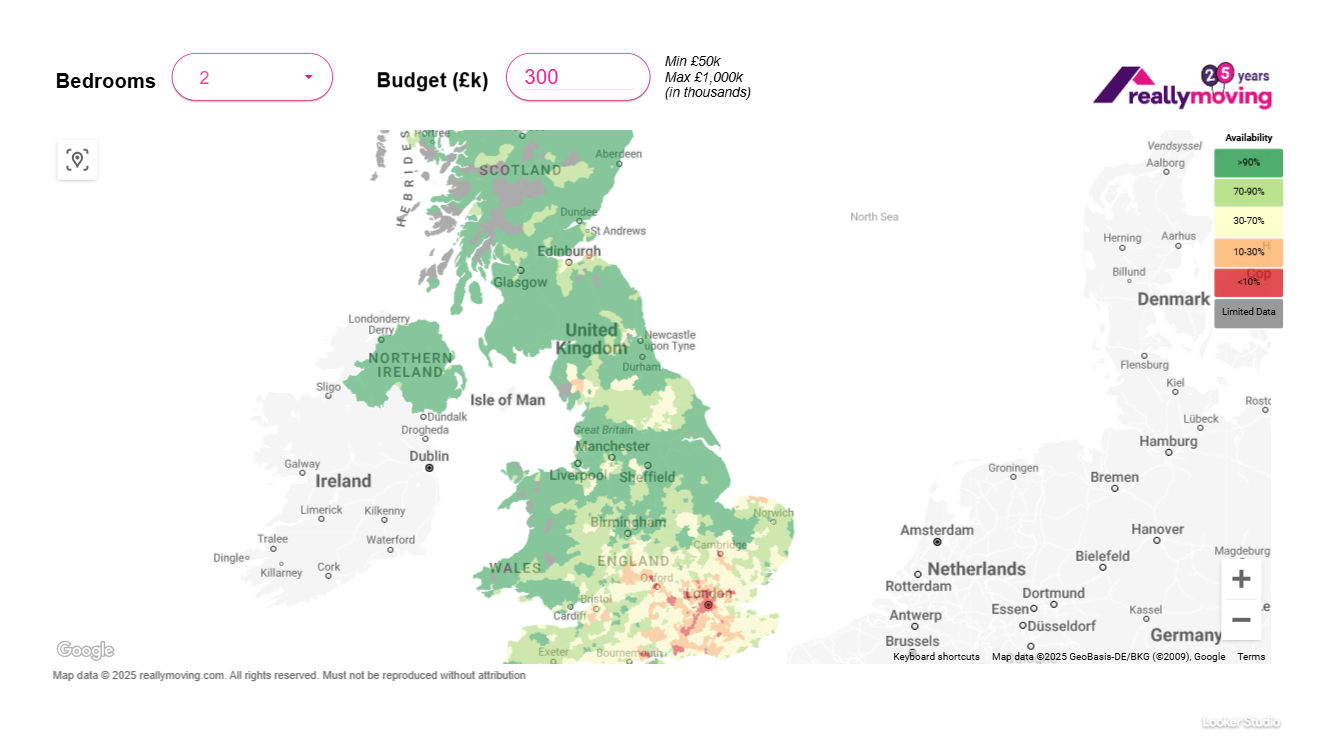Imagine a lifestyle that’s kind to the planet, builds meaningful connections, and helps you save for that brick-and-mortar home you’ve been dreaming of. Sustainable scaling is about enhancing your life through eco-friendly living and community-building strategies, all while keeping your financial goals in sight. This guide is for anyone navigating the UK’s pricey housing market or simply wanting to live smarter. We’ll dive into low-impact living, co-operative resource sharing, and local community networks—practical ways to cut costs, reduce your environmental footprint, and create a life you love. Let’s scale sustainably!
Why Sustainable Scaling?
Sustainable scaling is about making intentional choices to live lighter and connect deeper, all while building a foundation for your future home. Eco-friendly living slashes expenses like energy and food bills, freeing up cash for your deposit. Community-building strategies foster support networks, sharing resources and knowledge to make your journey easier. Together, they create a lifestyle that’s not just affordable but fulfilling, aligning your daily habits with your long-term vision of homeownership.
Low-Impact Living: Shrink Your Footprint, Grow Your Savings
Low-impact living means reducing your environmental footprint through smart, sustainable choices. From energy-efficient appliances to zero-waste habits, these strategies cut costs and make your lifestyle greener, helping you save for that brick-and-mortar goal.
Key Low-Impact Practices
- Energy-Efficient Appliances: Swap old appliances for A+++-rated ones, like fridges or washing machines, which use up to 50% less energy (Energy Saving Trust).
- Zero-Waste Habits: Embrace reusable items like water bottles, cloth bags, and beeswax wraps to reduce waste and spending on disposables.
- Minimalist Mindset: Buy only what you need, focusing on quality over quantity to save money and declutter your space.
- Grow Your Own Food: Even a windowsill herb garden can cut your grocery bill by £50–£100/year.
Costs and Savings
| Practice | Initial Cost | Annual Savings |
|---|---|---|
| A+++ Appliances | £200–£500 | £50–£150 on energy bills (Energy Saving Trust). |
| Zero-Waste Kit | £20–£50 | £30–£100 on disposables (Zero Waste Week). |
| Herb Garden | £10–£30 | £50–£100 on groceries. |
| Total Savings | – | Up to £350/year |
Pro Tips
- Check for eco-grants like the Energy Company Obligation (ECO4) to subsidise energy-efficient upgrades.
- Start zero-waste with one swap, like a reusable coffee cup, to ease into the habit without feeling overwhelmed.
Co-operative Resource Sharing: Pool to Prosper
Co-operative resource sharing is about teaming up with others to share tools, skills, or even food, cutting costs and building community. Whether it’s a tool library or a bulk-buying group, sharing resources means you spend less while fostering connections that make life richer.
How to Share Resources
- Tool Libraries: Join or start a local tool library to borrow items like drills or ladders instead of buying them.
- Bulk Buying: Team up with neighbours to buy staples like rice, pasta, or cleaning products in bulk, saving up to 20% (Which?).
- Skill Swaps: Trade skills, like teaching someone to cook in exchange for gardening tips.
- Community Fridges: Contribute surplus food to a shared fridge or take what you need, reducing waste and grocery costs.
Resource Sharing Benefits
| Method | Cost Saving | Community Benefit |
|---|---|---|
| Tool Library | £50–£200/year | Access to tools, stronger neighbour ties. |
| Bulk Buying | £100–£200/year | Cheaper essentials, group bonding. |
| Skill Swaps | £20–£100 per swap | New skills, deeper connections. |
| Community Fridge | £50–£150/year | Less food waste, support for all. |
| Total Savings | Up to £650/year | – |
Pro Tips
- Use apps like Olio or Too Good To Go to find local sharing initiatives or surplus food.
- Set clear sharing rules (e.g., return tools within a week) to keep things smooth and drama-free.
Local Community Networks: Connect for Support
Building local community networks means creating relationships with neighbours, local groups, or online communities to share knowledge, resources, and encouragement. These networks provide practical support—like tips on saving or access to free items—and emotional backing to keep you motivated on your homeownership journey.
Ways to Build Networks
- Join Local Groups: Sign up for community boards like Nextdoor or local Facebook groups to swap items, share advice, or find events.
- Attend Workshops: Look for free or low-cost sustainability workshops at libraries or community centres to learn skills like composting or budgeting.
- Volunteer: Help with local clean-ups or food banks to meet like-minded people and give back.
- Host Events: Organise a swap shop or potluck to connect with neighbours and build trust.
Community Network Benefits
| Activity | Cost/Time | Benefit |
|---|---|---|
| Local Groups | Free, 1–2 hours/month | Access to free items, savings tips. |
| Workshops | £0–£20/session | New skills (e.g., composting saves £50/year). |
| Volunteering | 2–4 hours/month | Stronger ties, emotional support. |
| Hosting Events | £10–£30/event | Builds trust, potential for swaps. |
Pro Tips
- Start small by introducing yourself to one neighbour or joining one group to avoid feeling overwhelmed.
- Keep a shared Google Calendar for community events to stay engaged and plan ahead.
Why Sustainable Scaling Fuels Homeownership
Sustainable scaling isn’t just about living green—it’s a financial strategy. By adopting low-impact practices, sharing resources, and building community networks, you could save up to £1,000/year (£350 from low-impact living + £650 from resource sharing). Pair these savings with a Lifetime ISA (LISA) for a 25% government bonus (up to £1,000/year on £4,000 saved), and you’re looking at £5,000–£6,000 in 5 years, plus interest—a solid chunk of your deposit. Beyond money, these habits teach budgeting, collaboration, and resilience, skills that’ll make you a savvy homeowner ready to tackle mortgage payments and maintenance.
Wrap it Up
Sustainable scaling is your blueprint for a lifestyle that’s eco-friendly, connected, and laser-focused on your brick-and-mortar dream. Low-impact living cuts bills, co-operative resource sharing saves cash and builds bonds, and local community networks offer support to keep you going. This isn’t just about saving money—it’s about creating a life that aligns with your values and goals. Ready to start? Pick one eco-habit, join a local group, or organise a swap with friends. Every step scales you closer to your forever home!
Energy Efficiency & Low-Impact Living
- Energy Saving Trust: A+++ Appliances
Official UK guide to energy-efficient appliances and potential savings. - Zero Waste Week UK
Annual campaign with practical tips for reducing household waste and saving money. - Grow Your Own – RHS
Royal Horticultural Society’s guide to starting home food production.
Co-operative Resource Sharing
- Olio Food Sharing App
Free UK platform for sharing surplus food with neighbors. - Too Good To Go UK
App for purchasing surplus restaurant/ supermarket food at reduced prices. - Library of Things UK
Tool and equipment lending libraries across London and Brighton.
Community Building
- Nextdoor UK
Hyperlocal social network for neighborhood connections and resource sharing. - CAG Oxfordshire
Example of UK community action groups organizing repair cafes and skill shares.
Financial Incentives
- Lifetime ISA (Gov.uk)
Government savings scheme offering 25% bonuses for first-time buyers. - Energy Company Obligation (ECO4)
Current UK scheme for energy efficiency grants.
Research & Data
- Community Fridges Network
UK network of shared fridge locations reducing food waste. - University of Leeds Sharing Cities Research
Academic insights into benefits of urban resource sharing.



